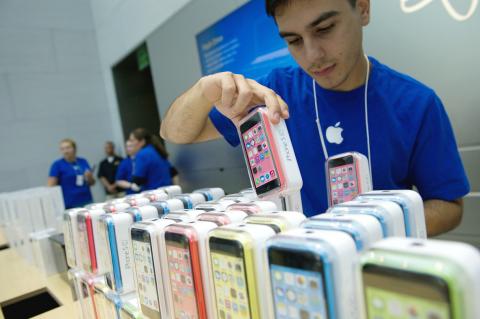Catcher Technology Co (可成科技), which makes metal casings for Apple Inc’s MacBook Air notebook and iPad mini tablet, is likely to receive new smartphone orders early next year, Barclays Capital Securities Taiwan Ltd said.
The new orders will be for Apple’s new iPhone 5S and Samsung Electronics Co’s premium Galaxy series during the first half of next year, Barclays analysts led by Dale Gai (蓋欣山) and Kirk Yang (楊應超) said in a note released on Thursday.
Catcher, which also supplies metal casings for HTC Corp’s (宏達電) smartphones, is likely to benefit from the growing trend of leading smartphone vendors adopting metal casings in their phones. So far, Samsung is the only top-five smartphone brand which is not using metal casing for its products.

Photo: Bloomberg
However, that could change. South Korea’s Electronic Times newspaper reported on Aug. 30 that Samsung might build a production line at its plant in Gumi, about 260km southeast of Seoul, to produce handset casing from magnesium and aluminium by the end of this year. The world’s largest smartphone brand is likely to apply metal casing to its premium models set to be released early next year, according to a report on the paper’s Web site.
In their note, Barclays analysts said that based on their checks with supply chain companies,
Samsung is close to a final decision on the adoption of metal casings in at least one of its high-end smartphone models from the second quarter next year.
“Our checks suggest Catcher has been qualified as one of the major sources on the total metal casing smartphone volumes at 10 [million to] 30 million next year from Samsung,” the analysts wrote.
“The final order allocation is to be confirmed in early first quarter 2014, subject to price bids by approved vendors,” they added.
Pauline Chen (陳柏齡), an analyst at Credit Suisse AG’s Taipei securities branch, said in a note to her clients on Sept. 4 that if Samsung decides to use metal casing for its flagship model next year, it is very likely to outsource some orders to non-South Korean suppliers in order to meet the requirements for volume and quality.
Chen said Catcher could also gain more orders from Apple next year as the US company is likely to adopt a new strategy to add new electronics manufacturing service (EMS) providers, including Wistron Corp (緯創) and Inventec Corp (英業達), to reduce risks for new products.
“We believe that the news should be positive for independent metal casing suppliers such as Catcher or Ju Teng International Holdings Ltd (巨騰) as these ‘new’ EMS suppliers could prefer to team up with independent casing makers, over their competitors’ casing subsidiaries,” she wrote.
Moreover, Catcher’s increased iPhone orders could help it offset the order losses from HTC, according to Barclays analysts, who predicted a 20 percent annual sales decline for HTC next year from this year.
“The increasing likelihood that Catcher will see iPhone 5S order gains in the first half of 2014 will likely completely offset HTC-related risks,” they said.
Shares of Catcher closed at NT$155 on Wednesday. Barclays reiterated its “overweight” rating on the company’s shares, with a target price of NT$179.

Taiwan Semiconductor Manufacturing Co (TSMC, 台積電) last week recorded an increase in the number of shareholders to the highest in almost eight months, despite its share price falling 3.38 percent from the previous week, Taiwan Stock Exchange data released on Saturday showed. As of Friday, TSMC had 1.88 million shareholders, the most since the week of April 25 and an increase of 31,870 from the previous week, the data showed. The number of shareholders jumped despite a drop of NT$50 (US$1.59), or 3.38 percent, in TSMC’s share price from a week earlier to NT$1,430, as investors took profits from their earlier gains

In a high-security Shenzhen laboratory, Chinese scientists have built what Washington has spent years trying to prevent: a prototype of a machine capable of producing the cutting-edge semiconductor chips that power artificial intelligence (AI), smartphones and weapons central to Western military dominance, Reuters has learned. Completed early this year and undergoing testing, the prototype fills nearly an entire factory floor. It was built by a team of former engineers from Dutch semiconductor giant ASML who reverse-engineered the company’s extreme ultraviolet lithography (EUV) machines, according to two people with knowledge of the project. EUV machines sit at the heart of a technological Cold

TAIWAN VALUE CHAIN: Foxtron is to fully own Luxgen following the transaction and it plans to launch a new electric model, the Foxtron Bria, in Taiwan next year Yulon Motor Co (裕隆汽車) yesterday said that its board of directors approved the disposal of its electric vehicle (EV) unit, Luxgen Motor Co (納智捷汽車), to Foxtron Vehicle Technologies Co (鴻華先進) for NT$787.6 million (US$24.98 million). Foxtron, a half-half joint venture between Yulon affiliate Hua-Chuang Automobile Information Technical Center Co (華創車電) and Hon Hai Precision Industry Co (鴻海精密), expects to wrap up the deal in the first quarter of next year. Foxtron would fully own Luxgen following the transaction, including five car distributing companies, outlets and all employees. The deal is subject to the approval of the Fair Trade Commission, Foxtron said. “Foxtron will be

INFLATION CONSIDERATION: The BOJ governor said that it would ‘keep making appropriate decisions’ and would adjust depending on the economy and prices The Bank of Japan (BOJ) yesterday raised its benchmark interest rate to the highest in 30 years and said more increases are in the pipeline if conditions allow, in a sign of growing conviction that it can attain the stable inflation target it has pursued for more than a decade. Bank of Japan Governor Kazuo Ueda’s policy board increased the rate by 0.2 percentage points to 0.75 percent, in a unanimous decision, the bank said in a statement. The central bank cited the rising likelihood of its economic outlook being realized. The rate change was expected by all 50 economists surveyed by Bloomberg. The